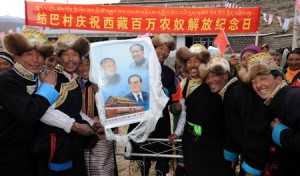John Pomfret has finally updated his blog, opining on a new global poll showing the Chinese, more than any other people on the planet, have the most profound “reality gap” between how they see their country compared to how the rest of the world sees it.
A new poll by researchers at the University of Maryland and Globescan sums it up in the starkest terms. A whopping 92 percent of Chinese surveyed believe that China has a mainly positive influence on the world; whereas a mere 39 percent of people polled in 20 other major countries agree. This is the largest perception gap among the countries’ polled. (And it’s getting worse. Views about China have declined markedly over the last year.)
Indeed, the survey makes us Americans look downright switched-on. According to the poll, some 60 percent of Americans surveyed thought the United States exerts a positive influence on the world; whereas 43 percent of people polled in the same 20 other major countries think it’s mostly negative. A tiny gap when compared to China’s. (Also China now ranks below the average the US in terms of positive influence for the first time since the poll was initiated five years ago.)
To me this poll illustrates one of the most interesting aspects of the world’s interaction with China. That’s the gap between how most Chinese perceive of their country and how the rest of us do. Most Chinese people appear to believe deeply in the benevolent role that China’s plays around the globe. I saw this during the 10 years I lived in China. And I see it in the regular and friendly interaction I have with Chinese officials.
It’s not surprising to see America in second place, of course. Anyone who spends a lot of time oversees (or even reads a lot of foreign magazines online) knows just how ugly America can look in the eyes of the world, in direct contradiction to our own perception of a benevolent, generous, often selfless friend to all the world. I got over this form of mild brainwashing when I was a teenager, and I often wonder why so many Chinese people find it next to impossible to even consider the possibility that their own image in the world is far different from their own perception.
Pomfret attributes this gap to good old-fashioned propaganda, which not only glorifies China’s achievements and filters out bad news that the rest of the world sees, and also to racism, which makes all of us wary of this mysterious new rising power. In their ignorance, Pomfret says, many people simply dislike and distrust Asians.
It’s a year since the ill-fated Olympic Torch Relay, which should have been an ear-splitting wake-up call to China. Not only did the planners fail to take into account the fact that the world would not appreciate taking the torch to Tibet and Mount Everest, they seemed to believe, like Americans walking into Iraq, that they would be greeted with open arms and a lot of joy. They seemed oddly out of touch with the animosity the world feels, justified or not, over Tibet and perceived human rights abuses in China. BOCOG’s decision to include Tibet (and originally Taiwan) on the route was a decision that dumbfounded me and many others. “How can they be so dumb? Why are they going out of their way to shake a global hornet’s nest?”
[Disclaimer: Part of my work last year involved the torch relay, but nothing related to the route. If it were up to me, all torch relays would be limited to their host countries. Everyone I know was appalled at the decision to take the torch to Tibet, an open invitation to the world’s activists to sabotage the event. But BOCOG, incomprehensibly, failed to see this, which is entirely consistent with Pomfret’s point.]
Pomfret closes with an example of a Chinese official in denial:
Some Chinese writers, such as Yan Lieshan, a columnist for Southern Weekend, have tried to address what he feels to be this dangerous gap in perceptions between China and the rest of the world. His pieces are popular and his most recent one is powerful. Here’s a taste:
When asked about the behavior of Chinese tourists on overseas trips, Vice Foreign Minister Wu Dawei said he did not agree that the tourists had “backward habits” that “disgraced” the country. “Yes, it’s always Chinese who gather in big crowds and talk loud in airports and restaurants, but it’s just a habit. We Chinese are not used to the foreigners’ murmuring and whispering at a close distance either,” said Wu. I totally disagree with Vice Minister Wu.
Little voices such as Yan’s can do little to shout down the triumphalism emerging from party central in Beijing.
Yan’s comment is like spitting into a hurricane. It’s going to take a lot of time and deprogramming before most Chinese people realize their perception of China is not a universal one. And yes, that goes for America as well, though the smoke in our eyes isn’t nearly as thick.


Comments